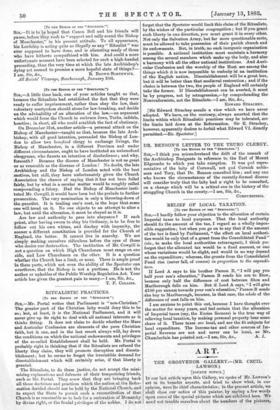RITUALISTIC PRACTICES.
[TD THE EDITOR OF THE " SPECTATOR." I SIE,—Mr. Portal writes that Parliament is "non-Christian." The greater part of the Christian laity would deny this to be so; but, at least, it is the National Parliament, and it will never give up its right to deal with all national interests as it thinks fitting. It does not claim to decide whether the Mass and Auricular Confession are elements of the pure Christian faith, but it can, and in the last resort always will, lay down the conditions on which the national endowments and privileges of the so-called Establishment shall be held. Mr. Portal is probably right in thinking that if the Ritualists are refused the liberty they claim, they will promote disruption and disesta- blishnnent ; but he seems to forget the irresistible demand for disestablishment which will certainly arise, if that liberty is granted.
The Ritualists, to do them justice, do not accept the mini- mising explanations and defences of their temporising friends, such as Mr. Portal. They avow that they are bringing back all those doctrines and practices which the nation at the Refor- mation decided should not be held by the National Church, and to expect the State to permit such a reconstitution of that Church is as reasonable as to look for a restoration of Monarchy by divine right, or the feudal rrivileges of the nobles. I do not forget that the Spectator would limit this claim of the Ritualists, by the wishes of the particular congregation ; but if you grant such liberty in one direction, you must grant it in every other. Not only the Salvation Army, but far more questionable sects, must be allowed to take possession of their parish church and its endowments. But, in truth, no such inorganic organisation is possible. A national institution must maintain a harmony among the several members which make up the body, and also• a harmony with all the other national institutions. And Auri- cular Confession and the worship of the Host are among the things which it is now impossible to embody in: an institution of the English nation. Disestablishment will be a great loss, but it will be better than that medimval restoration ; and if the choice is between the two, the people of England will certainly take the former. If Disestablishment can be averted, it must be by progress, not by retrogression,—by comprehending the Nonconformists, not the Ritualists.—I am, Sir, &c.,
EDWARD STRACHEY.
[Sir Edward Strachey assails a view which we have never- adopted. We have, on the contrary, always asserted that the limits within which Ritualistic practices may be tolerated, are• the limits laid down at the Reformation. Sir E. Strachey, however, apparently desires to forbid what Edward VI. directly permitted.—ED. Spectator.]


































 Previous page
Previous page